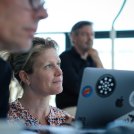Emerging worker-robot relations (WRRs) have various configurations (i.e., single worker, worker-client relation, or a team of workers), and are established within environments with complex sets of protocols with varying levels of autonomy (or not), and where power dynamics are at play. While WRRs promise new opportunities for innovation, cost reduction, and productivity, the actual impact of cognitive robots on work, workers, and management is yet to be unveiled. Workers may have diverse perceptions of how and whether WRRs are a positive development for them or not. Additionally, workers and unions may want to explore alternative scenarios where robots are not means of production imposed on workers but belong and act in solidarity with workers.
In line with principles of Industry 5.0 (planetary, societal, and workers’ well-being and social justice as central to work), there is an opportunity for technology design to re-configure power dynamics and improve job quality and retention, while providing meaningful and equitable work experiences for workers.
In this post-doctoral research project, our aim is to explore, understand, and reframe WRRs and workers-robot ownership of labor and the robot itself within the context of the cleaning industry.
We are going to hone-in data, robots, workers’ ownership of the workflow through analyzing narratives, imaginaries, and worldviews to unveil alternative configurations of ownership, agency, and solidarity.
Methodologically, our approach will be guided by design justice and organizational psychology. Research activities include:
1. Conducting a literature review;
2. Co-ethnography with workers, robots, unions, and legal scholars (including interviews field observations, and speculative enactments);
3. Speculative Co-creation sessions to understand values, narratives, imaginaries, agency and ownership configurations of robots and WRRs relations thereof;
4. Co-creation sessions to tangibly explore new ownership configurations and offer tools and strategies to workers and unions;
Our goal is to produce an actionable solidarity toolbox for long-term use, fostering awareness, understanding, and (worker) emancipation on how the robot operates, plus guiding new configurations of robot ownership. This will include a set of conditions for employers and employees if they will start working with automation/robotics.
Information and application
Please upload your application through the apply button before 8th of December, 2024.
Your application includes the following documents as a single pdf file with:
- CV (including contact information for at least two academic references)
- Title and abstract of your PhD dissertation,
- and two of your most relevant papers.
- Additionally, if applicable, your design portfolio.
For more information regarding this position, you are welcome to contact Cristina Zaga (c.zaga@utwente.nl)
About the organisation
The faculty of Electrical Engineering, Mathematics and Computer Science (EEMCS) uses mathematics, electronics and computer technology to contribute to the development of Information and Communication Technology (ICT). With ICT present in almost every device and product we use nowadays, we embrace our role as contributors to a broad range of societal activities and as pioneers of tomorrow's digital society. As part of a people-first tech university that aims to shape society, individuals and connections, our faculty works together intensively with industrial partners and researchers in the Netherlands and abroad, and conducts extensive research for external commissioning parties and funders. Our research has a high profile both in the Netherlands and internationally. It has been accommodated in three multidisciplinary UT research institutes: Mesa+ Institute, TechMed Centre and Digital Society Institute.





